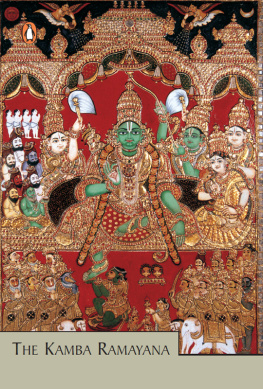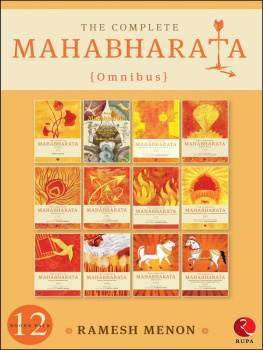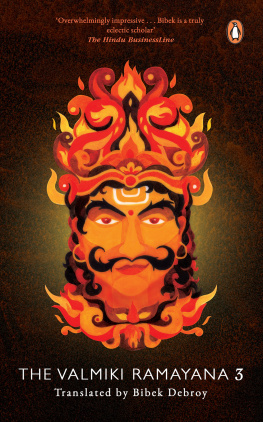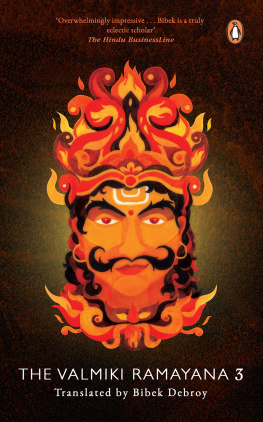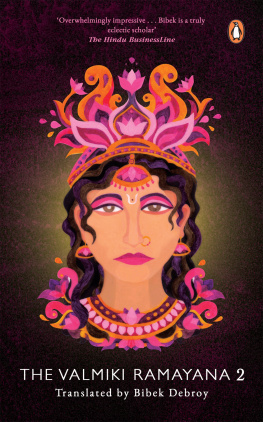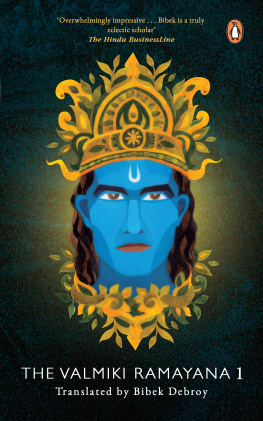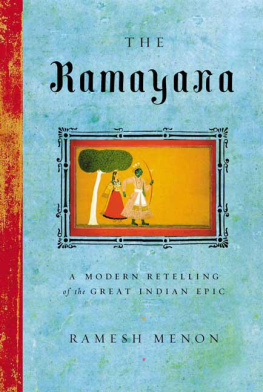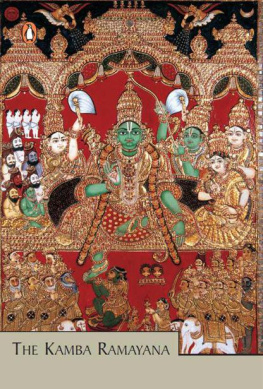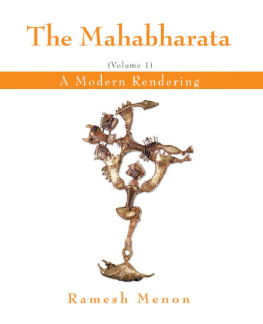Table of Contents
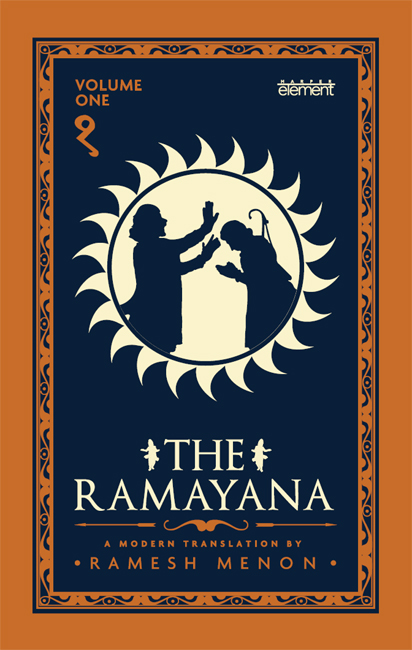
THE RAMAYANA
VOLUME 1
A Modern Translation
RAMESH MENON

HarperCollins Publishers India
For Janaki Amma and Rekha Janaki
CONTENTS
T HE RAKSHASA SAT IN PENANCE ON THE HIMALAYA, AMIDST FIVE fires. Four he lit around himself to heat the blazing rock he sat upon; the fifth was the pitiless sun above. Ravana was the son of the Rishi Visravas, who was Brahmas own grandson. Ten-headed, magnificent Ravana sat worshipping the God Siva. But even when he had sat for a thousand years, Siva did not appear before him.
Growing impatient one day, the Demon picked up his sword, cut off one of his ten heads and, chanting Sivas name, fed it to the fire. Still the Lord did not come to him. Another thousand years passed; Ravana severed another head and fed that into the fire. But even now, Siva did not come.
Ravana did not flinch. In nine thousand years, the Rakshasa cut off nine of his heads and fed them to the agni. But there was no sign of Siva. When ten thousand years of perfect worship had passed, Ravana reached for his sword again: to hew off his tenth and final head, and make an end of himself. Then his eyes were blinded with light like they had never seen before. At the heart of the lustre stood Siva, the God of Gods, smiling at his fierce devotee.
Raising his hand in a blessing over the Rakshasa, Siva said, Ask for any boon you want.
Ravana asked for strength that no other creature in the universe possessed. After the offering of nine heads, Siva could not refuse him. He restored the Rakshasas heads and gave him strength that would make him master of the earth one day.
But Ravana was not satisfied with one boon. He resumed his fervid penance, now in the name of his own great grandsire: Brahma, the Creator. In a hundred years, Brahma also stood, four-faced and iridescent, before the Demon. What boon do you want, Ravana? Ask me for anything.
Ravanas tapasya had been so remarkable he could have asked for moksha, enlightenment. But being a Rakshasa, he said, Siva has already given me boundless strength. Pitama, you make me immortal! Brahma replied, Immortality I cannot give, not to any of the created. Ask for another boon.
Ravana thought for a moment, and said shrewdly, Then bless me that I never find death at the hands of a deva, danava, daitya, asura, rakshasa, gandharva, kinnara, charana, siddha, or any of the divine and demonic beings of heaven and earth.
With a sigh, knowing what the consequences of this boon would be, Brahma said, So be it, and vanished.
Ravanas triumphant roar echoed through the world. The Himalaya trembled; the sea rose in hilly waves and dashed against the shores of Bharatavarsha. Of course, the Rakshasa had thought it beneath his dignity to ask for invincibility against the puny race of men. For which mortal man could hope to threaten awesome Ravanas life? He was certain that now he was immortal.
And quickly, with his two boons, the Demon became sovereign of all he surveyed. For long ages he ruled, and darkness spread
H ANUMAN COULD SEE INTO THE LITTLE CLOISTER FROM HIS leafy perch. He saw Sita shiver, when she knew the Lord of Lanka had arrived. Quickly she covered her body with her hands. Like frightened birds, her eyes flew this way and that, avoiding the Rakshasas smouldering gaze as he came and stood, tall and ominous, before her.
He drank deeply of the sight of her. He did not appear to notice how dishevelled she was, or the dirt that streaked her tear-stained face. Before him, Ravana, master of the earth, saw his hopes, his life, his heaven and hell; and, if he had known it, his death as well. She stared dully at the bare ground on which she sat. She was like a branch, blossom-laden, but cut away from her mother tree and sorrowing on the ground.
Ravana fetched a sigh. In his voice like sleepy thunder, he said, Whenever I come here, you try to hide your beauty with your hands. But for me, any part of you I see is absolutely beautiful. Honour my love, Sita, and you will discover how deep and true it is. My life began when I first saw you and yet you are so cruel to me.
She said nothing, never looked up at him. Hanuman, little monkey in his tree, sat riveted by what he saw and heard. Ravanas eyes roved over her slender form, and they blazed. He whispered, Sita, give yourself to me! I will love you as women only dream of being loved. Rule my heart, rule me and be queen of all the earth. We will walk hand in hand in this asokavana, just we two, and you will know what happiness is.
But again she set a long blade of grass between herself and him, like a sword. She said, I am another mans wife, Rakshasa. How can you even think of me as becoming yours, when I am already given? Not just for this lifetime, but forever, for all the lives that have been, and all those to come. I have always belonged to Rama, and always will. You have so many women in your harem. Dont you hide them from the lustful gazes of other men? How is it, then, you cannot conceive that I would be true to my Rama? That it is natural for me, because I love him.
He looked away from her. Not that he saw anything except her face, even when he did; but he could not bear what she said, that was so savage and so true. He had never encountered such chastity, and to believe in it would mean denying everything he had lived for. Ravana turned his gaze away from her and a smile curved his dark lips.
Undaunted, Sita continued, You court doom for yourself and your kingdom. Have you no wise men in your sabha to advise you against your folly?
He laughed. They all know I am a law unto myself. They know
I am invincible.
You have violated dharma; punishment will come to you more swiftly than you think. You dont know Rama. He is not what you imagine him to be. You speak of this sea being an obstacle between him and me. But I say to you, Ravana, even if the ocean of stars lay between us, my Rama would come to find me.
H OLY ONE, I WONDERED IF ANY MAN BORN INTO THE WORLD was blessed with every virtue by your Father in heaven.
Long ago, the sage Valmiki sat meditating in his hermitage on the banks of the Tamasa. The river murmured along beside the dark, gaunt rishi, whose hair hung down to his shoulders in thick dreadlocks. But otherwise the secluded place was silent; not even birds sang, lest they disturb Valmikis dhyana.
Suddenly the silence was shattered; the air came alive with the abandoned plucking of a vina. A clear voice sang of the Blue God who lies on his serpent bed, upon eternal waters. Valmikis eyes flew open. He had met him twice before, and he had a good idea who his visitor was.
Narada, the wanderer, was Brahmas son, born from his pristine thought, even as time began. A curse had been laid on Narada before the earth was made: that he would roam the worlds without rest.
Once he sent his brother Dakshas sons, who wanted to create the first races of men, on an impossible quest. He had asked them how they could become creators unless they first saw the ends of the universe. And Daksha cursed Narada to wander forever homeless and restless himself, for the endless wandering he sent those children on.
A fine aura enveloped Narada. Valmikis disciples stood gaping at him, until their master called briskly to them. Then they ran to fetch arghya, milk and honey, for the guest, who accepted their offering graciously.
Valmiki folded his hands, Be seated, Maharishi.
Valmiki sat beside the hermit from heaven, by the languid Tamasa. As if he sought something, Narada stared up and down the rivers course, while Valmiki sat absorbed.


